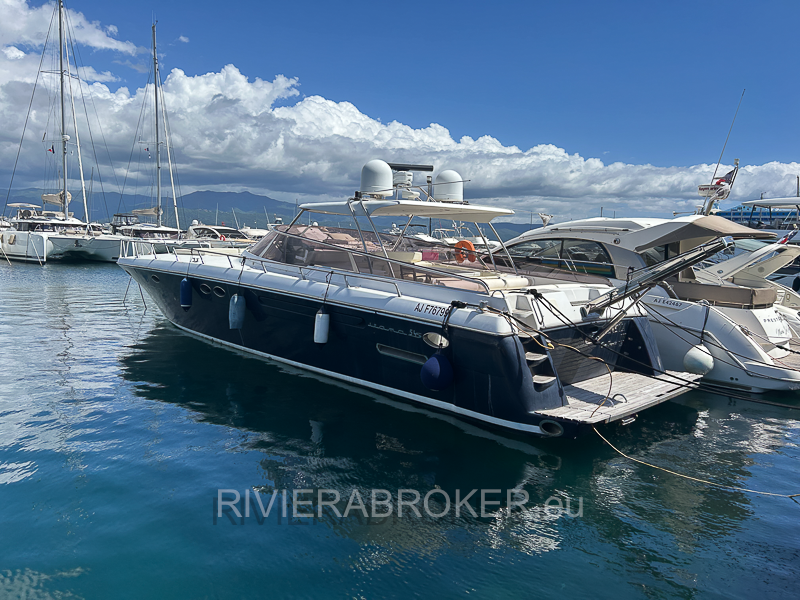The engine hours of a boat
What do you think of a used boat with a lot of engine hours?

With over 30 years of experience in the motoryacht industry, let me provide you with some advice for your next investment.
Before buying a boat, it is legitimate to ask yourself the question of engine hours and understand their impact on the value and performance of the boat.
All boats are equipped with an hour meter, or " hour meter", which accurately records engine operating time. This device is essential for assessing boat usage and planning maintenance periods.
While it is often preferable to opt for a used boat with the fewest engine hours possible, it is essential not to focus solely on this criterion.

Whether it's an outboard or inboard engine, most boats are only used 30 to 60 hours per year...
Marine engineering experts estimate that an engine should ideally run between 80 and 110 hours per year to be in peak condition.
It is also important to note that boat engines are often variants of land engines, and only their specific adaptation to the marine environment distinguishes them.
Comparatively, is it a lot for a land engine to reach 1000 hours?
It's important not to discount used boats with a 10-year usage history and between 800 and 1,100 hours. This represents an average of only 80 to 110 hours per year, which is considered reasonable. They can also be more attractively priced.
On the other hand, a very high number of operating hours over a short period may indicate commercial use, such as rental.
However, if maintenance has been carried out regularly and correctly by the owner, this is usually not a problem. The crucial element is the availability of the engine and hull maintenance history, with supporting invoices.
When browsing used boat sales ads, you will often notice a wide disparity in the number of engine hours for similar boats of the same year of construction...
This diversity may raise doubts, but it is important to remember that motor yachts are designed to sail and that regular engine operation is necessary for their proper maintenance.
So, rather than focusing solely on the number of operating hours, it is essential to examine all aspects of the boat, including operating conditions and maintenance history, to make an informed decision and find the boat that best suits your needs.

From my experience, I find that engine problems often occur due to lack of regular use, especially in winter.
Prolonged inactivity can lead to corrosion problems and failure of components, such as the alternator, starter or pumps.
Therefore, a ten-year-old used boat with low hours may be a sign that the engine has been left unused for long periods of time, which may indicate a lack of maintenance.
It is therefore essential to request maintenance invoices, where the engine hours are recorded chronologically, thus making it possible to track the use of the boat over time.
So what are the essential maintenance points to check?
First, carefully examine the maintenance and repair operations carried out on the engine, as recorded in the maintenance booklet supplied with the boat.
If the latter cannot be found, ask to see all available maintenance invoices.
The lack of regular maintenance monitoring is a serious problem.
Some boaters, who only use their boats for a few hours a season, sometimes neglect maintenance, arguing that it's unnecessary after only a few hours of sailing. However, it's important to note that most engines should be serviced every season, regardless of the number of hours they've been running, to ensure they remain in good working order for the long term.
Let's take a simple example: if the lifespan of the spark plugs is 150 hours and the boater only sails 30 hours per season, this means that these spark plugs could be changed every 5 years according to this reasoning. But is it really advisable?

Some owners perform engine maintenance work themselves, or entrust it to a mechanic friend.
Although this practice is not always ideal, it is imperative that the owner can provide purchase invoices for replacement parts (filters, spark plugs, oils, pump impellers, etc.) as proof of their replacement.
However, for optimal maintenance of the engines and their peripherals, I strongly recommend calling a professional.
In addition to their experience and skills, their responsibility is involved.
These invoices will be invaluable in the event of a serious problem requiring insurance intervention.
A conscientious professional should also recommend and/or mention the work to be planned on their final invoice, in order to avoid any unpleasant surprises or disputes at sea.
Finally, I would like to stress the importance of checking that the engine hours are correctly entered on the invoice.
This is why I strongly recommend to all my buyers to call on an approved expert, who will provide during the sale a written and impartial report on the condition of the boat, its engines and its accessories.
Although this represents an additional cost, this approach offers peace of mind to both the buyer and the seller, protecting them against possible unpleasant surprises.
